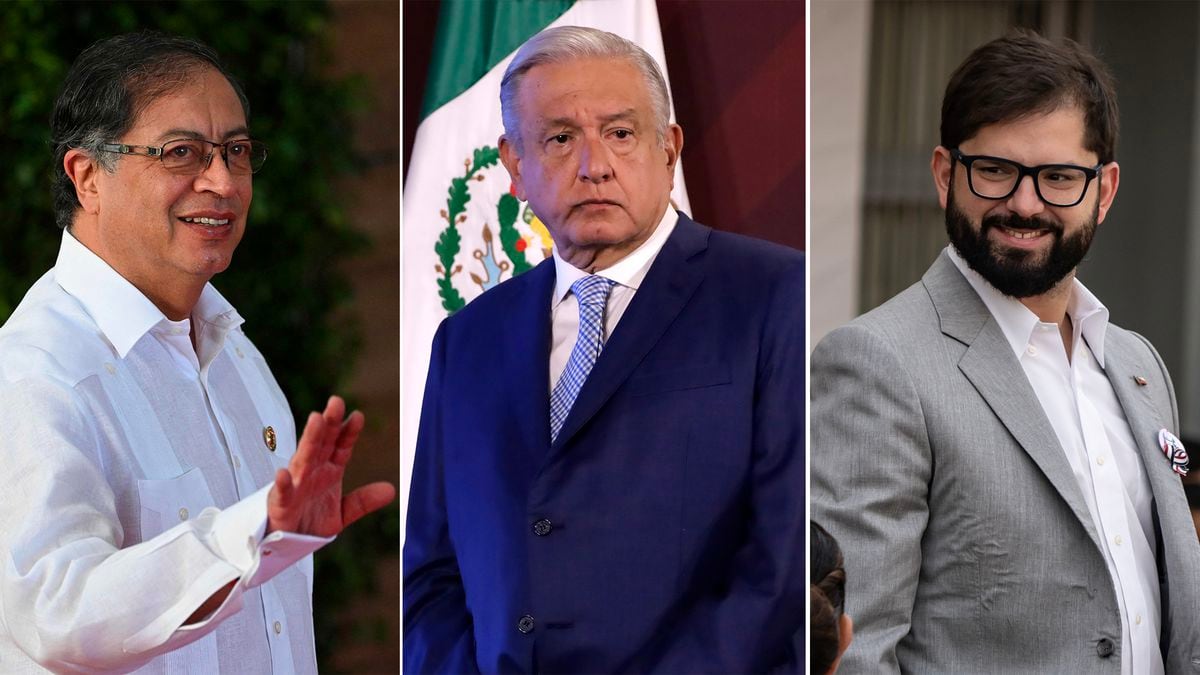A ghost is haunting Latin America: the ghost of neoliberalism. The powers recently established in the continent have entered into a holy war to exorcise that ghost: AMLO, Boric, Lula, Petro, Evo, Maduro, Ortega, Diaz-Canel, Correa and Pope Francis fight this specter that, they say, has been roaming freely in the region for 40 years.
To demonstrate the existence of this ghost, and the urgency of governments to exorcise it, I will take three examples, Mexico, Chile and Colombia.
In the explanatory memorandum to a recently submitted draft decree, the Mexican government says that from 1934 to 1982, a period known as 'Mexican developmentalism', Mexico's economic policy concentrated on industrialisation. However, in 1982 with the fall in international oil prices, government debt and rising international interest rates, a crisis gave way to the neoliberal model. The intervening State and its social responsibility were abandoned; in addition, the import-substituting industrialization model ('inward') was replaced by industrial, trade and financial liberalization and deregulation ('outward'), and IMF and World Bank guidelines were accepted.
According to that, neoliberalism in Mexico would have weakened the role of the state without improving its efficiency or reducing poverty or inequality. On the contrary, it would have accentuated those shortcomings. Consequently, the task today is to retrace neoliberalism and strengthen the state.
Let's look at Chile. In the book The Impatient Society, Eugenio Tironi argues that the overthrow of Salvador Allende has been, for 50 years, "a wound not entirely repaired, a source of deaf resentment." After the military coup of 1973, Chile would have gone from a 'European model', with an inward-looking capitalism, where the State, political parties, guilds and unions occupied a relevant role of articulation, to a 'US model', with a capitalism turned outwards and based on the market, private enterprise and individual effort.
In the present, says Tironi, a coalition of young people created an alternative to both the social democratic left (Concertación type) and the communist one, from a libertarian, feminist, ecological and territorial perspective. They are elite young people, educated at the best universities in the country and with postgraduate degrees in Europe and the United States. He disdains the order created by his parents during the so-called 30 years following Pinochet's fall.
The enemy is no longer political. Neither do the exploitative entrepreneurs, since this rhetoric of class struggle lost effectiveness in 1989 with the collapse of the socialist camp. Now there is a holy war against an ethereal adversary, difficult to define, but with powers similar to those of Satan: neoliberalism.
It is a war of good children, strawberries as they call them in Mexico, gomelos in Colombia, who no longer need the people but economic resentment against a neoliberal system (...). "In short, the new [Boric] government took on the project of making Chile 'the tomb of neoliberalism.'"
Let's move on to Colombia, where Gustavo Petro has set himself an even more ambitious task than AMLO and Boric, because he is not limited to retracing neoliberalism within national borders. He wants to do it on a planetary scale, based on the need to disarm what he calls "fossil capitalism", creator of climate change. To show that he is serious, he wants to put the country he presides over as his case, sacrificing it first to the energy transition. It opts for economic degrowth, following the latest advances of some theorists in Belgium.
It proposes the abandonment, sooner rather than later, of oil and coal, Colombia's two main legal export items, the replacement of national gas by Venezuelan gas and the rejection of mining extractivism.
Even the service sectors such as banking, insurance and commerce mortify him, because for him they do not create value, only agriculture and industry do. It coincides with the renationalizing agenda of AMLO and Boric for key services such as health, pensions, home public services and strategic infrastructure projects. It is their version of the anti-neoliberal holy war.
Within this conception there is a simple equation:
Market + Growth = Hope and Cohesion
Market - Growth = Frustration and Anguish
The key is the sign of growth.
In fact, they are based on the loss of economic dynamism in Latin America in the past decade, as a result of the Great Recession in the United States (2008-2010), the fall in commodity prices (2014-2015) and the flattening of Chinese growth.
If this interpretation of the neoliberal era is true, since the nineties it must be seen in the three countries, Mexico, Chile and Colombia, a decrease in the size of the State and an increase in poverty rates. Let's look at the numbers.
The graph shows that since 1990, the key year of the alleged neoliberal advent, just after the fall of the Berlin Wall in 1989 and the triumph of the Reagan-Thatcher doctrines (1980s), public spending as a proportion of the economy increased 60% in Mexico (from 16.6% to 27.1%, data) and Chile (from 20.4% to 33.5%); and tripled in Colombia (from 9.4% to 34.5%). That is, there was no such withdrawal either in the functions or in the size of the State.
Now let's look at poverty. The graph shows that over the past two decades poverty has been reduced to a quarter of what it was at the end of the last century.
I have been a public servant in Colombia for a good part of my professional career, from 1984 to the present, in the Central Bank, National Planning, the Ministry of Finance and Ecopetrol. I know the state thoroughly. The Manichean approach of a progressive European conception, sensitive to the public and the social, and a blind American neoliberal attitude, insensitive and dedicated to minimizing the public, could not be more wrong. It really doesn't stand up to serious analysis.
On the contrary, throughout these years, and from a healthy alternation of center-right and center-left governments, the functions of the State increased, but its administrative, effectiveness (focus) and efficiency (costs) powers were not expanded at the same speed, the State itself has needed successive reforms that are still continuing.
The State has increased health care, transfers to poor households, coverage of public services such as electricity, drinking water and sewage, household gas, infrastructure of ports, roads and energy, among others; as well as in the provision of justice and security. The latter two are currently challenging fronts. In some cases it has leveraged on private activity, with good results, and a joint and crucial learning.
This evidence shows that so-called neoliberalism is more of a phantom invented to focus people's attention on a common enemy and accuse it of all evils. Combining market and state is always a difficult task. In it I see, rather, in the three countries thousands of serious and dedicated professionals, waging gigantic battles against inefficiency, corruption and lack of focus, and trying to make the State and the market work to solve multiple and difficult problems. In the present and the future, the state and the market will serve to achieve the new political goals of young people as well as to continue attending to the old urgencies of our countries.
I have shown that it is not easy to define neoliberalism, nor to accuse various governments of recent decades, center-right and center-left, of sticking to it. Reversing many transformations that have worked well and taking the economic system to the inquisitorial bonfire of an auto de fe for alleged neoliberal sins can be a tremendous mistake that will pay dearly precisely for the poorest.
Subscribe here to the newsletter of EL PAÍS about Colombia and receive all the informative keys of the current situation of the country.
75% discount
Subscribe to continue reading
Read without limits
Read more
I'm already a subscriber






/cloudfront-eu-central-1.images.arcpublishing.com/prisa/U2R7NZPI4CFAXSB3RA5IFUE2VE.jpg)
/cloudfront-eu-central-1.images.arcpublishing.com/prisa/2C7HIYVHBZDA3HEZNJ6CDVQPUM.JPG)

